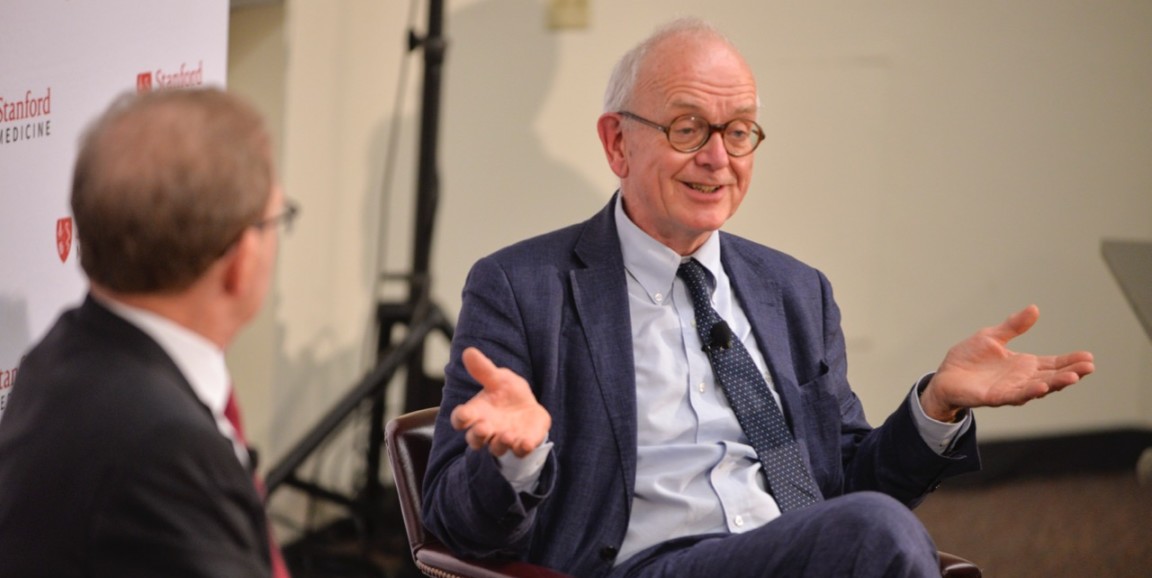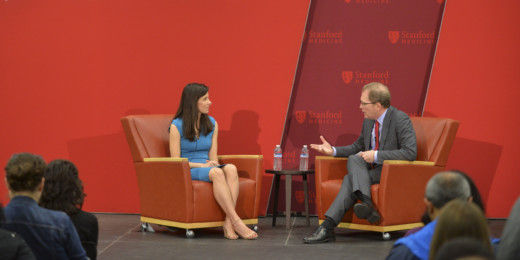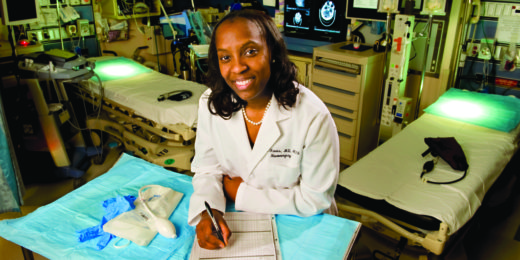At 68, the well-known neurosurgeon and author Henry Marsh, MD, doesn't want to be young again, he told attendees at the recent Dean's Lecture Series on campus. But, he would like a young brain.
"I'd like to come to Stanford and study something," Marsh said with a grin.
His host, Dean Lloyd Minor, MD, stepped in quickly: "You are always welcome."
The thought that Marsh, an acclaimed and outspoken British neurosurgeon who has authored books including Admissions: Life as a Brain Surgeon, advanced neurosurgery in communities in Ukraine and Nepal, and helped pioneer "awake" brain surgery, would choose to learn something totally new, may not be all that outlandish. Marsh's pursuits are varied, including recently working to restore a cottage (with a plumber he had operated on!), and memorizing Shakespeare's sonnets in an attempt to stave off dementia.
During their recent discussion, Minor and Marsh touched on a variety of topics including the emotional weight of working as a physician. Marsh shared that actual neurosurgery isn't the hardest challenge those in the field face, Marsh said. "The really difficult bit is when things go wrong and [we need to deal] with the patients and their families and colleagues," he said. "We make mistakes, we're fallible human beings."
"I have the sense that this degree of introspection and responsibility and living with the knowledge that not everything goes right is relatively new in the medical profession and I fear not everyone embraces it as you do," Minor said.
That's true, Marsh said.
Beginning as trainees, he said, physicians learn to mask their anxiety in an attempt to reassure patients. An internal conundrum arises: to succeed and advance, trainees must practice new skills on a patient. Yet they can't let on how scared they are, Marsh said.
"We learn to hide our fear," he said. "A lot of the time I'm really anxious and frightened and worried... It gets a bit easier as time goes on, but it never goes away."
Usually, neurosurgeons, especially senior ones, aren't as up front about their feelings. "By writing the books, I'm trying to set an example of being a bit more open about these things, but it's very difficult," he said.
Marsh has few if any qualms being open about an often-difficult topic, physician-assisted death, which he believes is a key mark of a civilized society.
The roots of his passion stem from multiple causes. First, he explained, he spent four months when he was young working as a nursing assistant in a dementia ward. "It made me feel very strongly there are some things that are worse than death," Marsh said. "There are plenty of states I did not want to be in if I could avoid it."
Marsh said he also remembered his parents, who were both accomplished, as they were at the end of their lives; his father had dementia "My father, I remember as the empty shell he became. He died 10 years too late."
The talk took plenty of lighter turns and contained other bits of Marsh's insight, including:
--There is only one reasonable question for a patient to ask a doctor, Marsh said: "What would you do if it was you?"
--One of the primary challenges of working in a less-developed nation is ensuring that patients get quality post-operative care, Marsh said. Often nurses are not adequately compensated or trained.
--On pursuing writing: "I come from a very literary, educated family. When I look back on my life and think of all the advantages I had, it would outrageous if I hadn't been successful... I was surrounded by books."
--In response to a question whether we'll ever understand the brain, Marsh said: "The answer is I don't know. I totally subscribe to the belief that it's matter, a physical system. Consciousness is an illusion I find very hard to apply to my everyday life."
Photo by Rod Searcey






